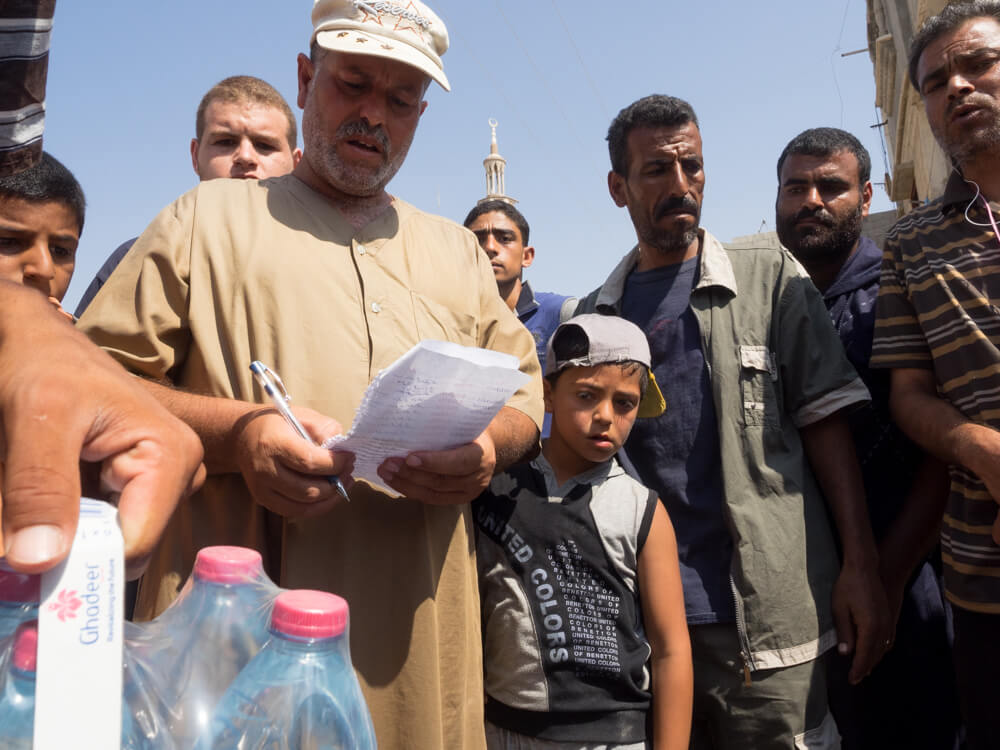A little-publicized report released during the final weeks of Israel’s summer offensive on the Gaza Strip last year accuses Israel of targeting water and wastewater infrastructure during the 51-day assault, despite having been provided the coordinates of all water and wastewater facilities.
Entitled Water Sector Damage Assessment Report, the paper by the Palestinian Water Authority (PWA) meticulously documents $34 million in damages that have caused a humanitarian and environmental crisis throughout the Gaza Strip.
Yet the damage detailed in the report is likely incomplete as the team is unable to assess damage to pipe systems because most of the damage is underground and covered by massive amounts of rubble.

In order to collect the information contained within the report, a team of technicians operated in the field, putting their lives at great risk. Indeed, seven employees were killed while conducting their duties, according to the report.
With virtually all of Gaza’s water unfit for consumption, the destruction of infrastructure greatly exacerbates existing problems resulting from eight years of siege and numerous Israeli offensives. About 97% of the water does not meet the World Health Organization (WHO) standards because of chloride and nitrate, according to Mahmoud Ismail, Director of the Palestinian Water Authority. Overpumping of the aquifers have lowered the water level — in some areas it reaches 15 meters below sea level which allows for seawater intrusion into the groundwater aquifer. The mixing of seawater into Gaza’s coastal aquifer has left the water unfit for drinking, cooking, or agricultural use.
Yet the residents and farmers of the eastern areas of the Gaza Strip may face an even more grim future. Public officials are concerned that heavy metals and uranium from Israel’s bombing campaign may have seeped into the groundwater, contaminating Gaza’s main water source for generations to come. Facings these concerns, officials need to take samples to ensure that the water is not affected by weapons, yet they have been unable to thus far. “We are looking for international consultant to enter Gaza to ensure that there is no negative impact from the last war on water resources,” Ismail explained.
Under the Israeli-Egyptian siege, rebuilding the destroyed infrastructure is an impossible task — many basic necessities including small pipes under twelve inches in diameter are banned under the siege, according to Ismail.
Existing infrastructure is choked off by the siege as well. One main that pipes in water sold by the Israeli company Mekorot has not been resumed for unknown reasons, though a physical inspection was conducted that found no leakage on the Gaza side, according to the report.
Beyond that, measures that Israel enforces make it cost-prohibitive to import materials. Checks and security procedures create added costs which are then passed onto the consumers.

Due to fuel shortages resulting from the siege, some water is simply inaccessible. The municipality has standby generators to pump each but no fuel to operate them. Beyond that, the pumps are costly and pollute heavily. “If you have water, maybe you don’t have electricity to raise it to the top of the reservoir,” Ismail explained.
The report calls for three stages of intervention. The immediate humanitarian intervention, which would have been implemented immediately after the final ceasefire, called for nearly $31 million for urgent humanitarian needs. These needs include reparation of damaged water and wastewater facilities, fuel to operate them, chlorine for water supply disinfection, and provision of water for displaced populations, as well as other urgent needs. The second stage calls for reconstruction of water and wastewater facilities, which is predicted to cost $32 million. The final stage calls for rehabilitation and expansion of the infrastructure throughout the Gaza Strip, which would cost $620 million.
Six months after the publication of the report, little has been done to ease the catastrophic conditions throughout the rubble-covered Gaza Strip. As Israeli warplanes and drones are a near-overhead, another major israeli offensive looms.
Here is the report in full:



Dan, you really are amazing and so obviously dedicated to justice.
Israel steals water and land and then poisons the remains. They should be made to pay for ALL of the reconstruction~ now! Egypt is also culpable for a lot of misery, but Israel is #1 in perfecting cruelty and destruction.
There will be an accounting one day, and soon, Inshallah.
Ireland,s TV Station is reporting ” Hizbollah attack kills 2 Israeli soldiers.Israel responds to this attack.Those poor Israeli soldiers , minding their own business are attacked by those Hizbollah terroreeeests trying to drive the, (sorry–all )Jews into the sea.
As usual , it is reported in such a manner as to make it look like this attack came in a vacuum.No mention of the attack by Israel 10 days ago.No mention of the IDF being outside it,s borders digging holes in someone else’s sovereign territory.Looks as if it is too sensitive at this time of remembering the Holocaust.
The report seems as if it was written by the Israeli embassy in Dublin.
“heavy metals and uranium from Israel’s bombing campaign may have seeped into the groundwater, contaminating Gaza’s main water source for generations to come”
If this proves true, what a tragedy. However, in that case, it may be that nearby Israelis will also receive these gifts, because Gaza’s aquifer serves a wider territory than Gaza alone. I had heard (can anyone confirm) that the drawdown of Gaza’s aquifer was a rewsult, in part, of Israeli uses of the water.
While yonah wants to talk about zionism 140 years ago the current evil being perpetrated by modern zionism is a much more pressing issue. Children freezing to death, water supplies and sanitation systems destroyed, the lives of millions threatened. Profiting every step of the way.
“Under the Israeli-Egyptian siege, rebuilding the destroyed infrastructure is an impossible task -”
Dan Cohen called it by its rightful name, ” Israeli-Egyptian siege”.